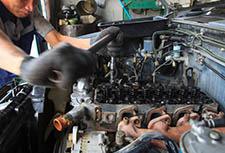Posted on 4/22/2018

Within seconds of turning on your vehicle's engine the motor heats up to incredibly high temperatures. If it weren't for the cooling system the engine would essentially melt itself. The cooling system, which includes such parts as the radiator, cooling fan, thermostat and water pump, pushes coolant through the engine to trap and remove heat. It is important that you get to a repair shop as soon as possible if you notice any of the following signs of cooling system failure. Rising temperature gauge One of the first signs you may notice if your car's cooling system is not operating as it should is a dashboard engine temperature gauge rising into the red zone. If you notice a skyrocketing temperature gauge be sure to pull over as soon as possible to allow the engine to cool down before major damage occurs. Steaming hood If you miss the rising gauge it is likely you will encounter white steam pouring out from under the hood. This is a positive sign that your car is currently overheating ... read more
Posted on 4/2/2018

Your diesel work truck hits the road day in and day out, putting up with dirty conditions that can result in numerous engine problems. When it comes to diesel repair and maintenance it is important that you leave the service to professional technicians. Diesel engines run much differently than traditional gasoline motors, so they require a special skill set or else the motor may end up in even worse shape. Be aware of the following issues, because if you begin to notice performance issues with your vehicle it could be related to one of them. Incorrect Engine Lubricants One of the most common causes of hard starting is the use of improper lubricant, A.K.A, engine oil. This is because if you use the wrong oil it may allow oxygen into the hydraulic system that assists the fuel injection unit, creating a foam that results in fake fuel injector pressure. It is necessary to use the correct oil as recommended by the manufacturer for different seasons of the year as well due to humidity and o ... read more